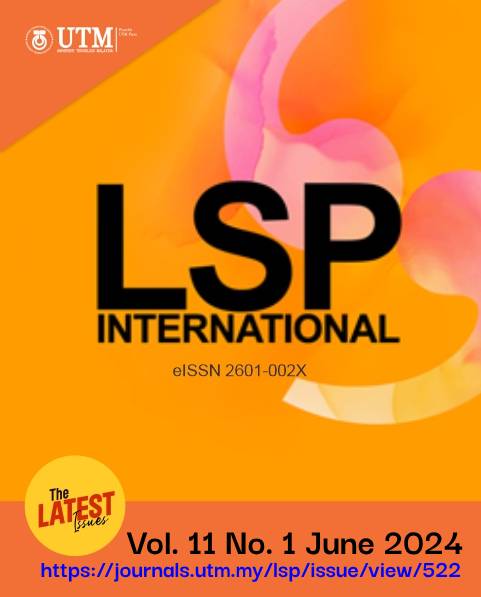Mental Health Discourse of Malaysian Women on Social Media
DOI:
https://doi.org/10.11113/lspi.v11.21505Keywords:
Corpus linguistics, discourse analysis, mental health, social media, COVID-19Abstract
This study delves into the psychological well-being of Malaysian women amidst the unprecedented challenges posed by the COVID-19 pandemic. By examining the discourse prevalent among Malaysian women on social media, particularly on Facebook, we seek to gain insights into their experiences and concerns during the pandemic. Public posts made during the COVID-19 period were systematically collected and assembled into a corpus utilising Lancsbox software. Through a careful analysis of this corpus, the study unveils the frequency and patterns of the topics written by Malaysian women. Moreover, it explores the contexts that shape these posts. Our research aims to shed light on the mental and emotional landscape of Malaysian women as reflected in their online interactions. The findings from this investigation hold the potential to offer valuable guidance to women and relevant stakeholders, contributing to a better understanding of how to support women's mental health within the realm of social media.
References
Adlina Ariffin et al. (2022). Investigating the impact of social networks on women working from home (WFH) in alleviating psychological distress. MCMC 2022 Report.
Adolphs, S., Brown, B., Carter, R., Crawford, P., Sahota, P., Limerick, M., Pilnick, A., Gibson, L., and Johnson, S. (2004). Applying corpus linguistics in a health care context. Journal of Applied Linguistics, 1(1), 9-28.
Afridi, F., Dhillon, A. and Roy, S. (2021). The gendered crisis: livelihoods and mental well-being in India during COVID-19. Available online at https://www.isid.ac.in/~fafridi/wp-content/uploads/2021/04/wp2021-65-Afridi-et-al..pdf.
Alinda Andul Rashid. (2019). The types and functions of code-switching among Malay bilinguals. Master’s thesis. Available online at https:studentsrepo.u.edu.my.
Brezina, V., Weill-Tessier, P., & McEnery, T. (2020). #LancsBox 5.x and 6.x [software]. Available at: http://corpora.lancs.ac.uk/lancsbox.
Brezina, V., Timperley, M., & McEnery, T. (2018). #LancsBox 4.x [software]. Available at: http://corpora.lancs.ac.uk/lancsbox.
Brezina, V., McEnery, T., & Wattam, S. (2015). Collocations in context: A new perspective on collocation networks. International Journal of Corpus Linguistics, 20(2), 139-173.
Brezina, V. (2018). Statistics in corpus linguistics: A practical guide. Cambridge: Cambridge University Press.
Brookes, Atkins, and Harvey (2021). Corpus Linguistics and health communication: Using corpora to examine the representation of health and illness. Available at http://wp.lancs.ac.uk/public-discourses-of-dementia/files/2022/05/Brookes-Atkins-and-Harvey-2022.-Corpus-linguistics-and-health-communication.pdf.
Cohan, A., Desmet, B., Yates, A., Soldaini, L., MacAvaney, S., & Goharian, N. (2018). SMHD: A large-scale resource for exploring online language usage for multiple mental health conditions. COLING.
Coppersmith, G., Dredze, M. & Harman, C. (2014). Quantifying mental health signals in twitter. Proceedings of the Workshop on Computational Linguistics and Clinical Psychology: From Linguistic Signal to Clinical Reality, 51-60.
Feuston, J. L., & Piper, A. M. (2018). Beyond the coded gaze: Analysing expression of mental health and illness on Instagram. Proceedings of the ACM on Human Computer Interaction, 2(CSCW), 51.
Flowerdew, L. (2004). The argument for using English specialized corpora to understand academic and professional language. In U. Connor & T. Upton (Eds.). Discourse in the professions; Perspectives from corpus Linguistics (pp. 11-33). John Benjamins.
Gulland, A. (2016). Women have higher rates of mental disorders than men, NHS survey finds. BMJ. 354. i5320.
Hou, F., Bi, F., Jiao, R. et al. (2020). Gender differences of depression and anxiety among social media users during the COVID-19 outbreak in China: A cross-sectional study. BMC Public Health.
Nadeem, M. (2016). Identifying depression on twitter. ArXiv:1607.07384 [Cs, Stat]. http://arxiv.org/abs/1607.07384
Nor Fariza Mohd Nor, Novelia Bernice Jeffree, and Hilwa Abdullah @ Mohd Nor, (2021). Health is wealth: a corpus-driven analysis of the portrayal of mental health in Malaysian English online newspapers. GEMA; Online Journal of Language Studies, 21(2), 46-71.
Pennebaker, J.W., Matthias R. M, Niederhoffer, K.G. (2003). Psychological aspects of natural language use: Our words, our selves. Annual Review of Psychology, 54(1), 547-577.
Price, H. (2022). The language of mental illness corpus linguistics and the construction of mental illness in the press. Cambridge University Press, Cambridge.
Trifan, A., Antunes, R., Matos, S., Oliveira, J. L. (2020). Understanding depression from psycholinguistic patterns in social media texts. Advances in Information Retrieval. ECIR 2020. Lecture Notes in Computer Science, Vol 1, 2036.
Valkenburg, P. M., Sumter, S. R. and Peter, J. (2011). Gender differences in online and offline self-disclosure in pre-adolescence and adolescence. British Journal of Developmental Psychology, 29, 253-269.
Vimala Balakrishnan, Azmawaty Mohamad Nor & Nor Zuraida Zainal. (2021). COVID-19 nationwide lockdown and its emotional stressors among Malaysian women. Asia Pacific Journal of Social Work and Development, 31(3), 236-249.
Vioulès, Mia Johnson, Bilel Moulahi, Jérôme Azé, Sandra Bringay. (2018). Detection of suicide-related posts in twitter data streams. Journal of Research and Development, 62(1), 7:1-7:12.
World Health Organization. (2022). Mental health and COVID-19: early evidence of the pandemic’s impact: scientific brief. Available at https://apps.who.int/iris/handle/10665/352189.
Yong, P. L. (2019). Women with mental health problems: A study at a care centre in Perak, Malaysia. Masters Thesis, Universiti Malaysia Sarawak.
















